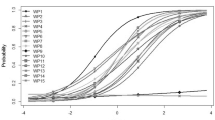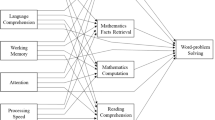Abstract
48 children from primary 4 in private and public schools (24 from each) were asked to solve 10 arithmetic word problems (involving “more” or “less” as the cue word) presented in English and in their native language. Retrospective clinical interviews were also conducted to find out how each child analyzed the meaning of each problem, before deciding which operation to use to solve it. The results revealed that both public and private school children performed better both in skills and in strategies when problems were presented in their native language than when presented in English, but only public school had the result to be significant (P<.025). Also data obtained from the interviews are in accord with psycholinguistic theories concerning the polarized comparative pair of “less” and “more”.
Similar content being viewed by others
References
Adetula, L. O.: 1985, The effects of language and schooling on the solutions of addition and subtraction word problems by Nigerian children, Doctoral dissertation, University of Wisconsin, Madison.
Adetula, L. O.: Sept. 1986a, Strategies and skills used by primary school children to solve simple addition and subtraction word problems, Paper presented at the annual National Conference of the Mathematical Association of Nigeria, Ilorin.
Adetula, L. O.: Sept. 1986b, Beyond paper and pencil tests in primary schools: A case for individual interview technique, Paper presented at the annual National Conference of the Mathematical Association of Nigeria, Ilorin.
AfolayanA.: 1976, ‘The six year-primary project in Nigeria’, in A.Bamgbose (ed.), Mother Tongue Education: The West African Experience, Unesco/Hodder & Stoughton Educational, Paris.
AustinJ. and HowsonA.: 1980, ‘Language and mathematical education’, Educational Studies in Mathematics 10(2), 161–197.
BryantP.: 1974, Perception and Understanding in Young Children, Methuen, London.
CarpenterI. P. and MoserJ. M.: 1984, ‘The acquisition of addition and subtraction concepts in grades one through three’, Journal for Research in Mathematics Education 15, 179–202.
ClarkR.: 1975, ‘Some aspects of psycholinguistics’, in E.Jacobsen (ed.), Interactions between Linguistics and Mathematical Education (UNESCO Report No. ED-74/Conf. 808, pp. 74–81), UNESCO, Paris.
ClementsM. A.: 1982, ‘Language factors in school mathematics’, Australian Review of Applied Linguistics 5(1), 9–24.
Clements, M. A. and Del Campo, G.: July, 1986, Linguistic and pedagogical factors influencing elementary school children's processing of arithmetic word problems, Paper presented at the ninth Annual Conference of the Mathematics Education Research Group in Australasia, Launceston.
ClementsM. A. and LeanG.: 1981, Influences on mathematical learning in Papua New Guinea: Some cross-cultural perspectives. PNG University of Technology Mathematics Education Centre, Lae, Report No. 13.
CuevasA. J.: 1984, Mathematics learning in English as a second language’, Journal for Research in Mathematics Education, 15, 134–144.
DonaldsonM. and BalfourG.: 1986, ‘Less is more: A study of language comprehension in children’, British Journal of Psychology 59, 461–471.
EhinderoO. J.: 1980, ‘The influence of two languages of instruction on student's levels of cognitive development and achievement in science’, Journal of Research in Science Teaching 17, 283–288.
Fafunwa, B.: 1978, Nigerian Daily Times, Sept.
GrayC.: 1962, Learning by Doing: Developing Teaching Skills, Addison Wesley Pub. Co., London.
HollandW. R.: 1960, ‘Language barrier as an educational problem of Spanish-speaking children’, Exceptional Children 27, 42–50.
HudsonT.: 1983, ‘Correspondences and numerical differences between disjoint sets’, Child Development 54, 84–90.
JonesP.: 1982, ‘Learning mathematics in a second language: A problem with more and less’, Educational Studies in Mathematics 13, 269–287.
Lean, G. L., Clements, M. A. and Del Campo, G.: 1990, ‘Linguistic and pedagogical factors affecting children's understanding of arithmetic word problems: A comparative study’, Educational Studies in Mathematics 21(2).
MacnamaraJ.: 1967, Bilingualism and Primary Education: A Study of Irish Experience, Edinburgh Press, Edinburgh.
MathewsW.: 1984 ‘Influences on the learning and participation of minorities in mathematics’, Journal for Research in Mathematics Education 15, 84–95.
MeekerM. and MeekerR.: 1973, ‘Strategies for assessing intellectual patterns in Blacks, Anglo- and Mexican-American boys — or any other children — and implication for education’, Journal of School Psychology 11(4), 341–350.
NesherP. and TeubalE.: 1975, ‘Verbal cues as an interfering factor in verbal problem solving’, Educational Studies in Mathematics 6, 41–51.
NewmanM.: 1983, Language and Mathematics Kit, Harcourt, Brace, and Jovanovich, Sydney.
Nigerian Primary School Mathematics Curriculum Guide (March, 1979), Iduma Printing Press, Lagos.
PalermoD.: 1973, ‘More about less: A study of language comprehension of less’, Developmental Psychology 10, 827–829.
PiagetJ.: 1973, Psychology of Intelligence, Little Field Adams and Company, New Jersey.
RichardsM. R.: 1979, ‘Sorting out what's in a word from what's not: Evaluating Clark's semantic features acquisition theory’, Journal of Experimental Child Psychology 27, 1–47.
SharfuddinS.: 1984, ‘Mathematical linguistics, mathematical language, and their interaction with mathematical education’, in D.Sinha (ed.), Proceedings of Seminar-Cum-Workshop on Mathematical Linguistics, Mathematical Language and Interaction with Mathematical Education, Pearl Offset Press, Kertinager, New Delhi.
SiegelL. S.: 1978, ‘The relationship of language and thought in the preoperational child: A reconsideration of nonverbal alternatives to Piagetian tasks’, in. L. S.Siegel and C. J.Brainerd (eds.), Alternatives to Piaget: Critical Essays on the Theory, Academic Press, New York.
UNESCO: 1953, The use of researcher languages in education, UNESCO monograph on fundamental education (Vol. VIII), University Press, Paris.
UNESCO: 1975, Interactions between linguistics and mathematical education’, Report of a UNESCO-CEDO-ICMI Symposium, UNESCO, Paris.
VygotskyL. S.: 1962, Thought and Language, MIT Press, Cambridge, Mass.
WeinerS. L.: 1978, ‘On the development of more and less’, Journal of Experimental Child Psychology 26, 271–287.
WhorfB. L.: 1956, Language, Thought and Reality; Selected Writings of B. L. Whorf (ed. J. B.Carroll), MIT Press, Cambridge, Mass.
WishartL.: 1977, ‘Language as a factor in the teaching of mathematics in primary school infact departments: The acquisition and use of polarised comparative terms’, in M.Clements and J.Foyster (eds.), Research in Mathematics Education in Australia, Vol. 2, Swinburne College Press, Melbourne.
Author information
Authors and Affiliations
Rights and permissions
About this article
Cite this article
Adetula, L.O. Language factor: Does it affect children's performance on word problems?. Educ Stud Math 21, 351–365 (1990). https://doi.org/10.1007/BF00304263
Issue Date:
DOI: https://doi.org/10.1007/BF00304263




